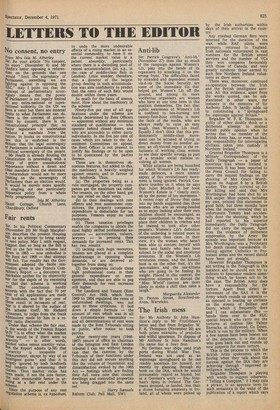No consent, no entry
From Mrs Isla M. Atherley
Sir: Re your article 'No consent, no entry' (November 6) and Mr 'puffin's letter opposing a referendum on the grounds that one would "limit the supremacy of Parliament, something we are fighting against in opposing the EEC," may I point out that the concept of parliamentary sovereignty means that the power ,of Parliament is not legally limited °Y any extra-national or supranational authority (in the UN we have a veto) but there are internal turas to what Parliament can do. There is the concept of government by consent, there is the constitutional principle that no major legislation is undertaken Without a mandate from the nation. In books on constitutional law this is enshrined in the dictum: that the legal sovereignty of Parliament is subordinate to the Political sovereignty of the people.
Mr Heath is already flouting the Constitution in proceeding with a policy of grave constitutional linPortance without a direct and clear mandate from the electorate.
referendum would not be more Minting on the sovereignty of Parliament than an election would. It would be merely more specific !risingling out one particularly olVortant policy from a whole Party programme.
Isla M. Atherley Hazel Cottage, Church Lane, Chardlbury, Oxford










































 Previous page
Previous page